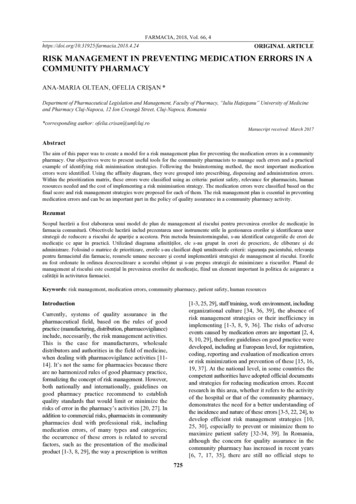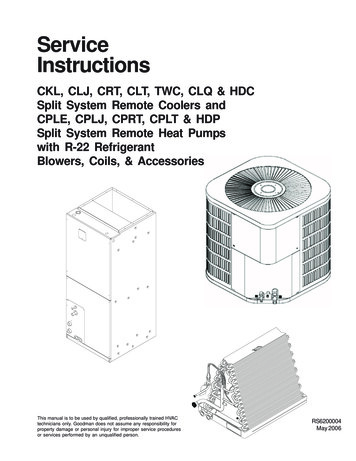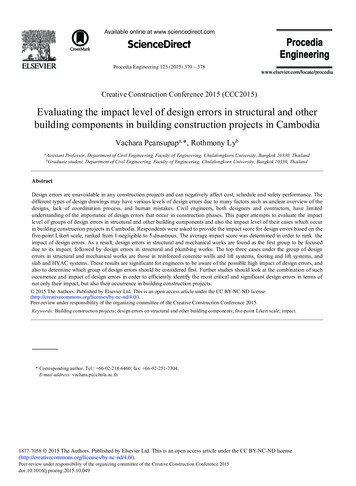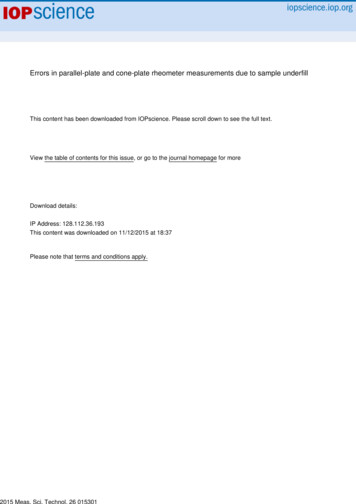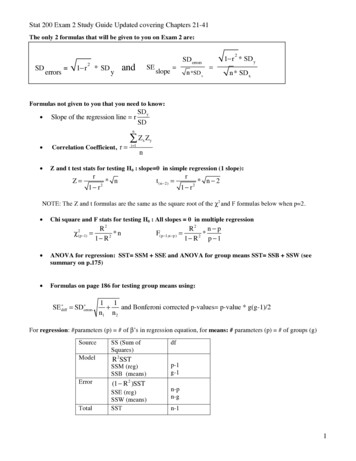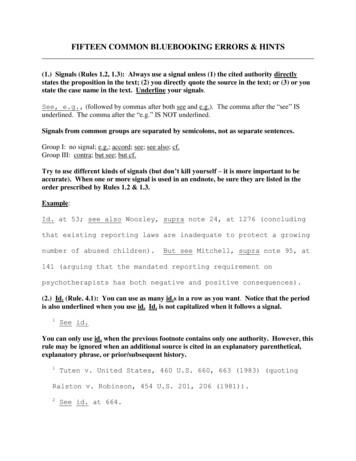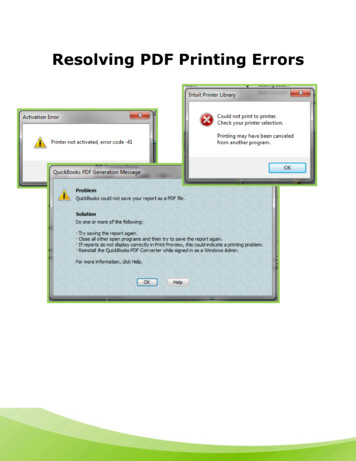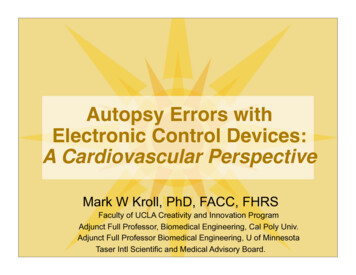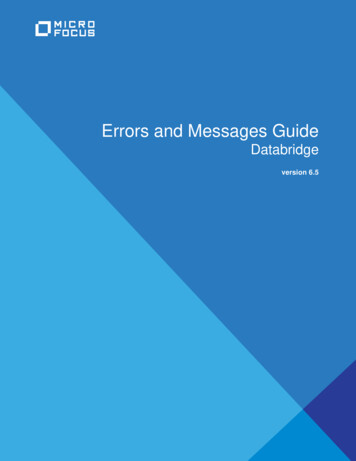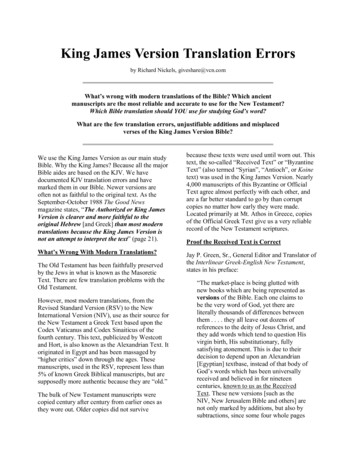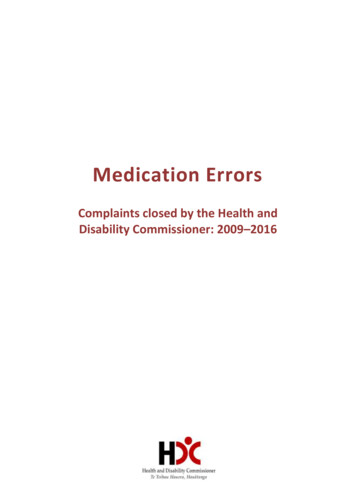
Transcription
Medication ErrorsComplaints closed by the Health andDisability Commissioner: 2009–2016
FeedbackWe welcome your feedback on this report. Please contact Natasha Davidson at hdc@hdc.org.nzAuthorsThis report was prepared by Natasha Davidson (Senior Advisor — Research and Education)Citation: The Health and Disability Commissioner. 2018. Complaints Closed by the Health andDisability Commissioner about Medication Errors: Analysis and Report 2009–2016.Published in December 2018by the Health and Disability CommissionerPO Box 1791, Auckland 1140 2018 The Health and Disability CommissionerThis report is available on our website at www.hdc.org.nz
ContentsCommissioner’s Foreword . iExecutive Summary. 1Reducing Medication Error . 2Electronic medication management . 2Following policies/procedures . 2Prescribing errors . 3Dispensing errors . 3Administration errors . 4Error reporting . 5Background . 61.Medication errors. 6Definition and incidence of medication errors. 6Medication error in New Zealand . 82. Using complaints data to investigate medication error . 8Complaints to the Health and Disability Commissioner . 8The value of complaints for quality improvement . 9Using complaints to investigate medication error . 93. The data used in this report .104. Objectives of this report .11Characteristics of Medication Errors .121.Stage of medication process in which error occurred .12Introduction . 12What does the HDC complaints data show? . 122. Setting of medication errors .13Introduction . 13What does the HDC complaints data show? . 13What does this tell us? . 143. Types of medications involved in errors .15Introduction . 15What does the HDC complaints data show? . 16What does this tell us? . 17Types of Errors and Contributing Factors .191.Describing and categorising medication error .19Introduction . 19Our coding methodology . 232. Prescribing errors .23Introduction . 24What does the HDC complaints data show? . 25What does this tell us? . 30Reducing prescribing errors . 383. Dispensing errors .41Introduction . 41What does the HDC complaints data show? . 43What does this tell us? . 47Reducing dispensing errors . 55
4.Administration errors .58Introduction . 58What does the HDC complaints data show? . 59What does this tell us? . 64Reducing administration errors . 73Error Reporting .76Conclusion .79APPENDIX: Contributing Factors .80
Commissioner’s ForewordMuch can be learned from the trends and patterns that emerge across complaints. The analysis ofcomplaints data about a selected adverse event (such as medication error) can be particularlyvaluable for providing insights into the common contributing factors to that event. I am committed toensuring that such analysis occurs and is reported back to the sector and general public in a way thatsupports quality improvement. With this in mind, I am pleased to present this analysis of complaintsto HDC where it was found that a medication error had occurred.Medication is the most common intervention in health care, and it is important to note that most ofthe time, the care that is provided is very good. Most New Zealanders who are prescribed, dispensed,and administered medication will receive safe and effective care. However, when medication errorsdo occur they have the potential to cause significant harm. It is therefore vital that the contributingfactors are analysed, and that lessons are learned, preventative action taken, and systemsstrengthened to ensure that such errors do not occur again.The process by which medication is delivered to a patient is a journey that involves multiple steps,multiple providers, and multiple healthcare settings. This can make the process vulnerable to error,but also ensures that there are multiple checks in the process that can prevent any errors fromreaching the patient. It is imperative that every provider in the process ensures that the right personis receiving the right drug for the right reasons in the right dose at the right time.This analysis highlights an issue I often see in complaints — a failure to do the basics well; that is, afailure to read the notes, talk to the patient, ask the questions, and undertake the necessary checkingprocedures. It is incumbent on prescribers, dispensers, and those administering medication to thinkcritically each time they deliver a medication — considering the drug, the patient, and the context inwhich the medication is being delivered — to ensure that the medication is being delivered safely.Providers must also undertake the necessary checks to ensure they are undertaking their role safely.These basics can often be overlooked in the context of distraction and busy workloads, but they arevital to ensuring patient safety.I was struck by the number of errors in which a failure to follow policies and procedures was acontributing factor. Individual providers are accountable for ensuring that they are followingappropriate policies/procedures. Deliberate deviations from policies and procedures can seriouslycompromise patient safety and result in consumers not receiving an appropriate standard of care.However, one of the strengths of HDC is our ability to put individual behaviour in its systemiccontext. A failure by multiple staff to follow policies and procedures can point to a system that hasallowed a culture of tolerance to emerge — where the suboptimal has become normal, and notfollowing policies and procedures has become everyday practice. Such tolerance is not acceptable.Organisational leaders must be alert to such issues, and ensure that staff are supported to do what isrequired of them, and that a culture is fostered where adherence to policies/procedures is “the waywe do things around here”.I encourage all providers, when reading this report, to consider, “Could this happen at my place?”and, if so, what changes could be made to prevent it. My thanks to all those who have shared theirexperiences and, in doing so, have made this report and the learning contained within it possible.Anthony HillHealth and Disability Commissioneri
Medication ErrorsExecutive SummaryThis report presents an analysis of complaints closed by the Health and Disability Commissionerbetween 2009 and 2016 where a medication error was found to have occurred. Complaints to HDCoften involve more than one provider, and multiple medication errors are sometimes involved in asingle complaint. A separate analysis was undertaken for each medication error complained about.Therefore, although there were 310 complaints about medication errors, 338 medication errorswere analysed (the complaints data). Each error was coded for the stage of the medication processat which the error occurred (prescribing, dispensing, or administration); the setting of the error; theclass of medication involved in the error; the type of error that occurred; and the factors identifiedby HDC's expert advisor or the provider in their incident analysis as having contributed to the error.The aim of this report is to provide an analysis of the HDC complaints data in order to shed light onsome possible patterns regarding contributing factors that lead to medication error. The report alsocollates the lessons from our findings and from the case examples detailed in the report, in order toassist providers and organisations to recognise and address factors that contribute to medicationerrors.It should be noted that although analysis of complaints data can be valuable for looking at thecontributing factors to selected types of adverse events (such as medication errors), complaints datais not a proxy for quality of care. Generalisations cannot be made based on complaints data, andthere are a number of factors that limit the conclusions that can be drawn.The majority of medication errors in the complaints data were due to a complex interplay of humanand organisational factors. Many medication errors were slips/lapses, whereby providers madeinadvertent errors often due to error-producing conditions or latent factors in the organisationalenvironment.No one stage of the medication process (prescribing, dispensing, or administration) wasdisproportionately responsible for the majority of errors in the complaints data, with each stagebeing responsible for around a third of the errors complained about. Types of errors andcontributing factors differed by the stage of the medication process involved.The most common prescribing error was the prescribing of an inappropriate medication (prescribinga contraindicated medication or a medication to which the consumer was allergic or had had aprevious adverse reaction). The other common type of prescribing error was prescribing the wrongdose of medication
This report presents an analysis of complaints closed by the Health and Disability Commissioner between 2009 and 2016 where a medication error was found to have occurred. Complaints to HDC often involve more than one provider, and multiple medication errors are sometimes involved in a single complaint. A separate analysis was undertaken for each medication error complained about.File Size: 984KBPage Count: 88
